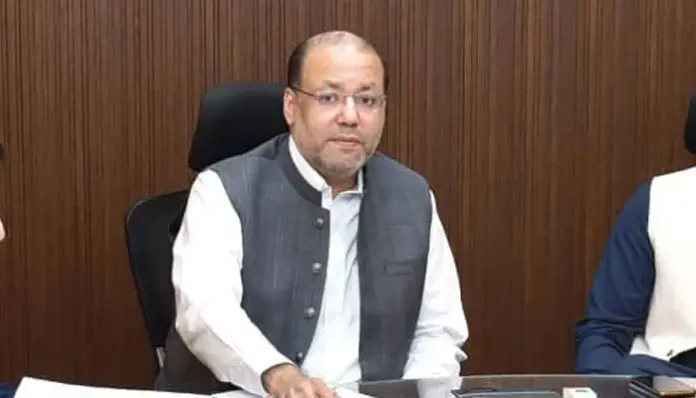- Advertisement -
LAHORE, Nov 01 (APP):Provincial Minister for Industries, Commerce and Investment Chaudhry Shafay Hussain said on Friday that alternative energy sources and industrialisation were the prime areas of focus for the Punjab government.
“An agreement with a Chinese group has been finalised for manufacturing of solar panels in Punjab, while the negotiations with Austria are also well on the way to build small hydel projects in Pakistan,” he stated during a meeting here at Lahore Chamber of Commerce and Industry (LCCI).
LCCI President Mian Abuzar Shad, Senior Vice President Engineer Khalid Usman and Vice President Shahid Nazir Chaudhry gave a detailed overview of the ongoing business situation and shared various solutions. Former LCCI Presidents Mian Anjum Nisar, Muhammad Ali Mian, former Senior Vice President Ali Hussam Asghar and former Vice President Tahir Manzoor Chaudhry also spoke on the occasion.
Provincial Minister said that his role as an industrialist offers him unique insights into business concerns, vowing to support and elevate the industrial sector through impactful and sustainable initiatives.
He highlighted the significant ongoing projects such as the Punjab’s largest industrial estate FIEDMC where infrastructure developments, including perimeter wall construction and telecommunication improvements are underway. “I have submitted a request to the Prime Minister to establish a railway station within the estate to streamline goods transportation, benefiting local manufacturers.”
The minister shared further plans to drive energy efficiency and reduce operational costs for Punjab’s industries. He said that a 30 MW solar power plant is being installed to provide affordable electricity to the Faisalabad Industrial Estate.
He also expressed views about a new partnership with a Chinese company to manufacture solar panels locally to reduce reliance on imports and boosting the local green energy sector. Citing India’s impressive solar panel export figures, he expressed optimism that Punjab’s solar manufacturing could similarly contribute to the economy.
LCCI President Mian Abuzar Shad underscored Punjab’s crucial role in Pakistan’s GDP, contributing over 50 percent. He said that rising production costs in Punjab affect the entire country’s industrial sector. He said that escalating gas, electricity and fuel prices, high policy rates and manufacturing charges that severely impacting operational budgets.
He advocated for a more supportive financial environment for SMEs, which comprise over 65 percent of Punjab’s business landscape, including accessible loans without excessive collateral requirements. To alleviate the pressure of rising land costs, he proposed a straightforward leasing policy to make land available to both new and existing SMEs at affordable rates, as industrial estate land prices have surged to nearly Rs 50 million per acre.
LCCI Senior Vice President Engineer Khalid Usman and Vice President Shahid Nazir Chaudhry called for greater representation of LCCI within the boards of industrial regulatory bodies. They highlighted that enhanced collaboration would streamline policy implementation and ensure timely support for industrial challenges. They recommended increased planting of trees within industrial estates and urged Punjab’s Parks and Horticulture Authority to support reforestation efforts.
Ch. Shafi Hussain also gave details about the plans to position Punjab at the forefront of electric vehicle (EV) manufacturing. The province now hosts a modern electric bike manufacturing plant in Sundar Industrial Estate, which aligns with the Chief Minister’s commitment to advancing EV technology. Additionally, discussions with Austrian counterparts are underway to launch small hydroelectric projects across the province, a move that is expected to diversify Punjab’s energy mix.
Addressing environmental concerns, Minister Hussain said that while air pollution control is critical, shutting down industries is not a viable solution. He highlighted that recent studies show transport as the primary source of smog, accounting for 83% of emissions, while industrial contributions remain relatively lower. He urged that any regulatory actions should include prior notification to businesses and urged the Punjab government to promote electric vehicles to curb transport emissions. He recommended collaboration with banks to provide businesses with low-interest loans for acquiring pollution-reducing technologies.
He said that Chinese company have shown a keen interest for investment in Garment City in Sheikhupura’s Quaid-i-Azam Industrial Area, with facilities available for lease and designed for energy efficiency through solar power. This initiative, along with plans to develop a “Shoe City” and small electric vehicle manufacturing facilities, is expected to attract foreign investment, particularly from Chinese companies facing rising labor costs at home.

